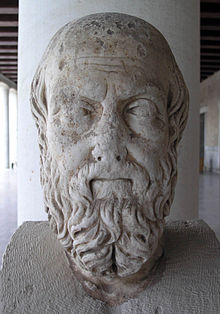Herodotus
![]()
The title of this article is ambiguous. For other meanings, see Herodotus (disambiguation).
Herodotus of Halicarnass(os) (ancient Greek Ἡρόδοτος Hēródotos; * 490/480 BC; † c. 430/420 BC) was an ancient Greek historian, geographer and ethnologist. In his philosophical work De legibus, Cicero gave him the epithet "father of historiography" (Latin pater historiae), which is still often quoted today. His surviving works are the Histories, probably written in the 2nd century BC and divided into nine books, which describe the rise of the Persian Empire in the late 6th century BC and the Persian Wars in the early 5th century BC in the form of a universal history.
The geographical horizon presented by Herodotus in the Histories even included the peripheral zones of the world imaginable to the Greeks of his time, in which there was room for mythical creatures and fantasy images. The composition of the Persian army under Xerxes I in the campaign against the Greeks was, however, also an occasion for Herodotus to deal with the manifold peculiarities in external appearance and culture of the participating peoples. In addition, he referred to his own impressions of his extensive travels. Thus, the work contains a large number of references to the most diverse everyday customs and religious rites, but also reflections on power-political constellations and constitutional issues of the time.

Bust of Herodotus
Live
By his own account, Herodotus was born in the Greek polis of Halicarnassus in Asia Minor, now Bodrum. Like others in his family, he was politically opposed to the local dynast Lygdamis and was forced into exile to Samos sometime in the 460s BC. After the fall of Lygdamis, he returned before the mid-450s BC, but left Halicarnassus for good a short time later.
According to his own statement, Herodotus undertook extensive travels, the chronology of which, however, is uncertain: to Egypt, to the Black Sea region, to Thrace and Macedonia as far as Scythia, to the Near East as far as Babylon, but probably not to Persia proper. Some researchers (the so-called Liar school), however, doubt these statements and consider Herodotus a "parlour scholar" who in truth never left the Greek world.
Between the journeys reported by him, Herodotus preferred to stay in Athens, where, as in Olympia, Corinth and Thebes, he gave lectures from his work, for which he was handsomely rewarded. According to an Athenian inscription, he received a gift of ten talents at the request of a certain Anytos. Herodotus' second hometown was the Greek Apoikia Thurioi on the Gulf of Taranto, newly founded in 444/3 BC, where, according to Roman tradition, he completed the Histories and where his tomb was later shown in the area of the Agora. The year of death, like the year of birth, can only be determined approximately, but in any case it is after the outbreak of the Peloponnesian War in 431 BC, to which Herodotus still referred.
Eponyme
In 1986 the asteroid (3092) Herodotus was named after him. The lunar crater Herodotus is also named after him.
Questions and Answers
Q: Who was Herodotus?
A: Herodotus was an Ancient Greek historian who lived in the 5th century BC and is known as the "Father of History".
Q: Where did Herodotus live?
A: Herodotus lived in Halicarnassus, a town in south-west Asia Minor (now Bodrum, Turkey).
Q: What is Herodotus most famous for writing about?
A: Herodotus is most famous for his writings about the wars between the Persian Empire and the Greek city-states.
Q: Did he travel to other places during his life?
A: Yes, according to his own writings, Herodotus travelled to Italy (including Sicily), Ukraine, Egypt and Pakistan. He may also have travelled to Babylon in today's Iraq.
Q: How did he get information for his works?
A: Herodotus often used stories from people he met while travelling to write about other places and happenings.
Q: Is it possible that some of what he wrote wasn't true?
A: Yes, it is possible that some of what he wrote wasn't true since he would have relied on information from various sources.
Search within the encyclopedia